Computer-Science
On-memory file system
on-disk, on-memory file system, mounting, process and file system, file system calls
0. Accessing a file in EXT2
x=open("/d1/d2/f1", .....); // find the inode of "/d1/d2/f1"
- read the super block and find the location of the group descriptor
- read the group descriptor and find the location of the inode table
- read the inode table, find inode 2, find the block locations of “/”
- read the blocks of “/” and find the inode number of “d1”
- find the inode of “/d1” and find the block locations of “/d1”
- read the blocks of “/d1” and find the inode number of “d2”
- find the inode of “/d1/d2” and find the block locations of “/d1/d2”
- read the blocks of “/d1/d2” and find the inode number of f1
- find the inode of “/d1/d2/f1”
1. on-disk, on-memory file system
1) on-disk file system: file system data structure on disks. example: EXT2, FAT, ….
2) on-memory file system
- disk is slow => open, read, write take too much time
- we cache frequently-used data (superblock, inode, group descriptor,…) into memory
- when caching, some additional information is added
- each disk has its own file system, and we need to know which meta block came from which disk
2.1) caching superblock
- (1)
- on-disk : ext2_super_block{}
- on-mem: super_block{}
- (2) additional info in super_block{} (include/linux/fs.h)
- s_list : next superblock
- s_dev: device number. which disk this superblock came from?
- s_type: file system type?
- s_op : operations on superblock
- s_root : root directory of the file system of this superblock
- s_files : link list of file{} belonging to this file system
- s_id : device name of this super block
- (3) all cached superblocks form a link-list pointed to by “super_blocks” (fs/super.c)
2.2) caching inode
Individual inode is cached when accessed by the system.
- (1)
- on-disk : ext2_inode{}
- on-mem: inode{} (include/linux/fs.h)
- (2) additional info
- i_list : next inode
- i_dentry: corresponding dentry list for this inode
- i_ino : inode number
- i_rdev: device this inode belongs to
- i_count: usage counter
- i_op: operations on this inode
- i_sb: pointer to super_block{} this inode belongs to
- i_pipe: used if a pipe
- (3) all cached inodes form a linked-list pointed to by “inode_in_use” (fs/inode.c)
2.3) caching other blocks
- (1) added info
- a buffer_head{} structure is attached to each cached block: (include/linux/buffer_head.h)
- b_blocknr : block number
- b_bdev : device this block belongs to
- b_size : block size
- b_data : original block
- (2) all cached blocks are attached to a hash table, “hash_table_array”(linux 2.4)
2.4) dentry table
- (1) for each cached directory entry, dentry{} structure is defined
- For example, when reading “/aa/bb”, three dentry objects are created: one for “/”, another for “aa”, and the last for “bb”.
- (2) dentry{} (include/linux/dcache.h)
- d_inode: pointer to the corresponding inode
- d_op : operations on this dentry
- d_mounted: this inode is a mounting point if d_mounted > 0
- d_name: corresponding file name (d_name.name is the actual file name)
2. mounting
All cached file systems are connected into one virtual file system through “mounting”
1) root file system: the first file system cached into the system
- other file systems are mounted on this root file system
2) mount(“/dev/x”, “/y/z”) or “mount /dev/x /y/z”
- meaning: mount the file system in /dev/x on /y/z
- mounted file system: /dev/x
- mounting point: /y/z
- mounting process:
- cache the file system in /dev/x
- cache superblock of /dev/x : sb
- cache the root inode of /dev/x : rinode
- sb->s_root = rinode
- connect the new file system to the mounting point
-
d_mounted of /y/z += 1 allocate vfsmount{}and set mnt_mountpoint=/y/z mnt_root= rinode mnt_sb=sb insert this vfsmount{} into mount_hashtable````
-
struct vfsmount{ // include/linux/mount.h. mounting info of this fs struct vfsmount *mnt_parent; // parent vfsmount struct dentry *mnt_mountpoint; // mounting point struct dentry *mnt_root; // root of this file system struct super_block *mnt_sb; // super block of this file system char *mnt_devname; // dev name ....... };
-
3) example
Suppose we have two disks: dev0 and dev1. Suppose they have the file trees as below:
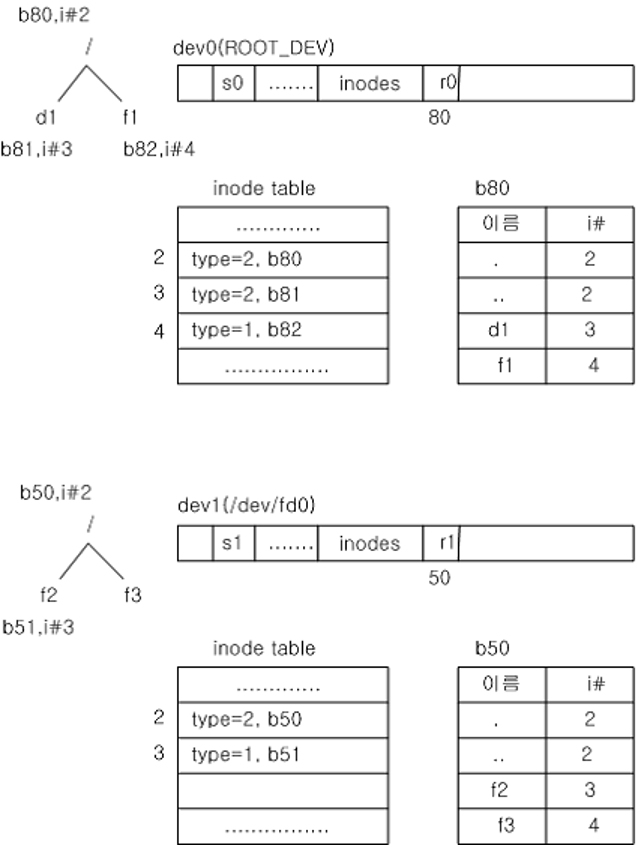
Assume dev0 is the root device (one which has the root file system).
(1) start_kernel() -> kernel_init() -> prepare_namespace()->mount_root()
- mount_root() caches the root file system: - cache the superblock - cache the root inode After this, the system has:
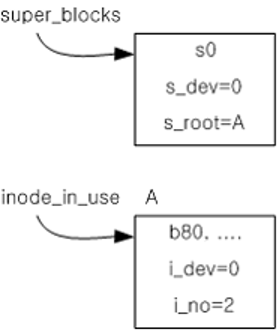
(2) “mount /dev/fd0 /d1”
- cache the file system in /dev/fd0
- cache the superblock of /dev/fd0
- cache the root inode of /dev/fd0
- cache the inode of /d1
- cache the block of “/”
- cache the inode of /d1
- connect the root inode of /dev/fd0 to /d1
After caching the file system of /dev/fd0:
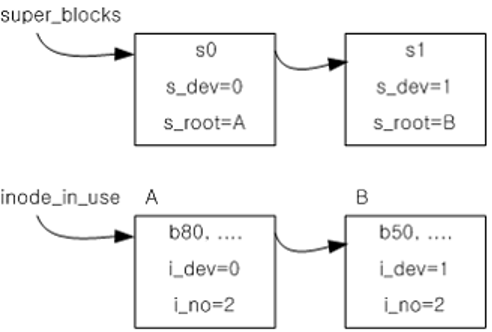
After caching the block of “/”:
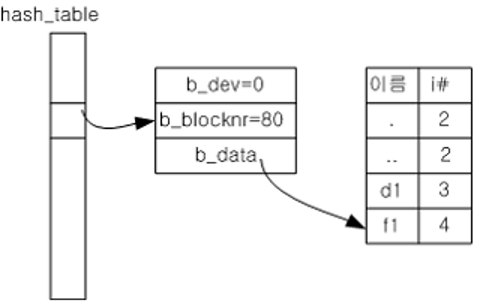
After caching the inode of “/d1” and connecting the new file system with this:
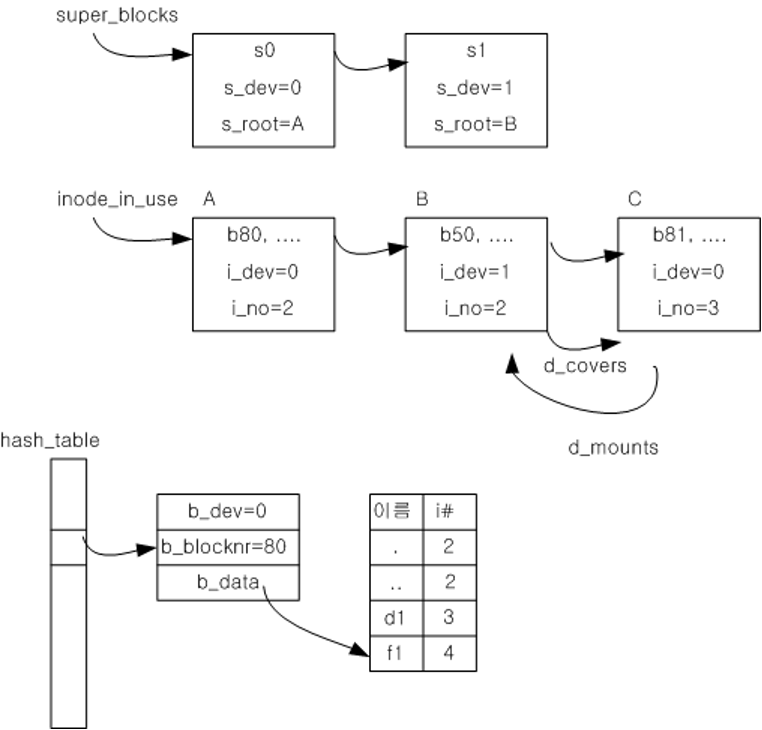
After mounting, the final tree looks like:
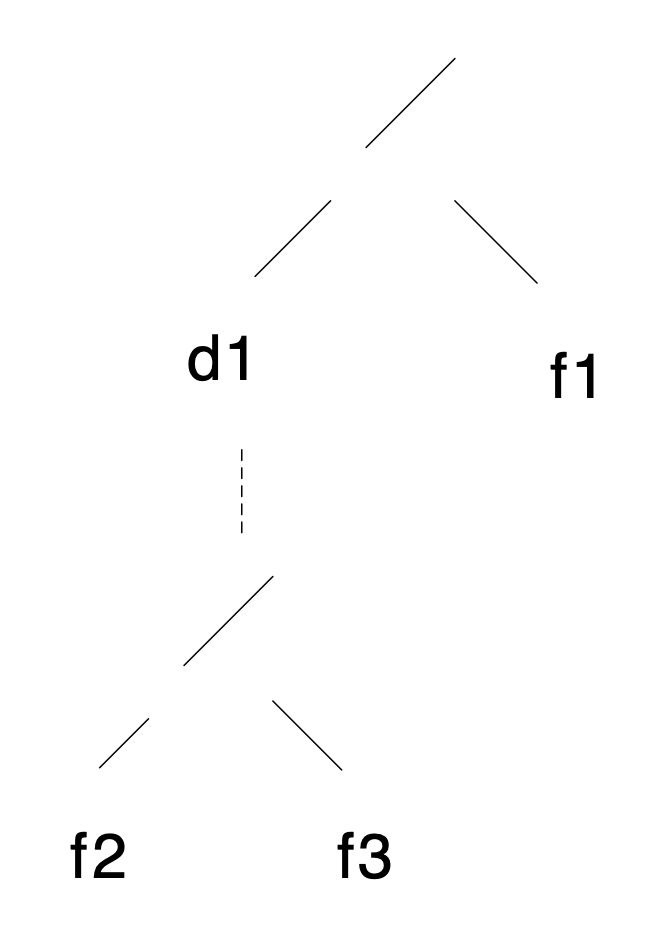
The above tree will look as below to the user:
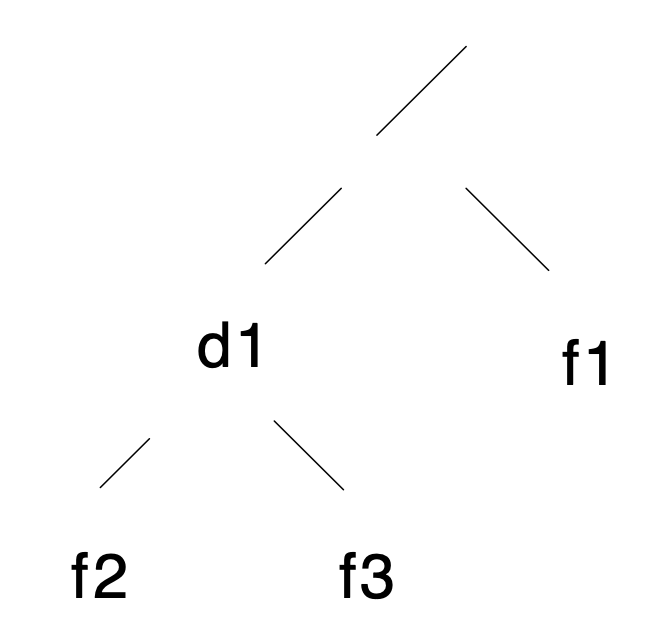
3. process and file system
- each process has “root” and “pwd” to access the root of the file system and to access the current working directory, respectively.
- example
- p1’s root is what p1 thinks as “root”
- p1’s pwd is the current location of p1
- when p1 says “/aa/bb”, the system starts at p1’s root for the search
- when p1 says “aa/bb”, the system starts at p1’s pwd for the search
chroot()changes “root” to a “new root”chdir()changes “pwd” to a “new pwd”.
- example
- each process has “fd table” for file accessing
- the system has “file table” to control the file accessing by a process
- the on-mem file system is represented by inode_in_use, super_blocks, hash_table_array

1) file table
- for each opened file, we have file{} structure (include/linux/fs.h)
- f_list: next file{}
- f_dentry: link to the inode (actually dentry{}) of this file
- f_op : operations on this file{ (open, read, write, …)
- f_pos : file read/write pointer. shows how much has been read/written
- f_count: number of links to this file{}
- ……….
- super_block{}->s_files contains a link list of file{} for each file system
2) root, pwd, fd table
- each process has (in task_struct) – include/linux/sched.h
struct fs_struct *fs;
struct files_struct *files;
struct nsproxy *nsproxy; // namespace
struct nsproxy{ // include/linux/nsproxy.h
struct mnt_namespace *mnt_ns;
......
};
struct mnt_namespace{ // include/linux/mnt_namespace.h
struct vfsmount * root; // vfsmount of this process
.........
};
- fs contains root, pwd info
struct fs_struct{ // include/linux/fs_struct.h
struct path root, // the root inode of the file system
pwd; // the present working directory
.........
};
struct path { // include/linux/path.h
struct vfsmount *mnt;
struct denry *dentry;
};
- files contains fd table
struct files_struct{ // include/linux/file.h
struct fdtable *fdt;;
...........
};
struct fdtable{
struct file **fd; // fd table. file{} pointer array.
.......
};
- fork system call copies this fs, files structure, too – so, the child inherits the root, pwd, and fd table of the parent.
4. file system calls
1) open
x = open(“/aa/bb”, O_RDWR, 00777);
- meaning: find the inode of /aa/bb and open it
- algorithm:
- find the inode of
/aa/bb - cache into memory
- connect to file table
- allocate
file{},y, insert tosb->s_fileslinklist(sbis the superblock of this process) y->f_dentry= inode of/aa/bby->f_pos=0
- allocate
- find an empty entry in
fdtable,z, and link toyfd[z] = y
return z
- find the inode of
- Example:

2) read
y = read(x, buf, 10)
- meaning: go to the file pointed to by
fd[x]and read 10 bytes intobufwithf_op->read() - algorithm:
- go to
file{}pointed to byfd[x] - go to
inode{}pointed to byfile{}->f_dentry - find the block location we want
- find the block in hash_table_array
- if not there, cache the block first
- read max 10 bytes starting from
file{}->f_posintobuf - increase
file{}->f_posby actual num of bytes read - return the actual num of bytes read
- go to
3) write
y = write(x, buf, 10)
- meaning: go to the file pointed to by
fd[x], write max 10 bytes starting from the correspondingf_pos, increasef_posby the actual num of bytes written, and return the actual num of bytes written.
4) close
close(x);
- meaning: close the file pointed to by
fd[x] - algorithm:
fd[x]=0file{}->f_count--, wherefile{}is the one pointed to byfd[x]
5) lseek
lseek(x, 20, 0)
- meaning: modify
f_posto 20, wheref_posis the file pointer of filex. - example:
x=open(“/aa/bb”, .......); // open file /aa/bb
read(x, buf, 10); // read first 10 bytes into “buf”
lseek(x, 50, SEEK_SET); // move f_pos to offset 50
read(x, buf, 10); // read 10 bytes staring from offset 50
6) dup
y = dup(x);
- meaning: copy
fd[x]intofd[y] - example:
x = open(“/aa/bb”, ........); // fd[x] points to /aa/bb
y = dup(x); // fd[y] also points to /aa/bb
read(x, buf, 10); // read first 10 bytes
read(y, buf, 10); // read next 10 bytes
7) link
y = link(“/aa/bb”, “/aa/newbb”);
- meaning:
/aa/newbbis now pointing to the same file as/aa/bb - algorithm:
- make file
newbbin/aadirectory - give it the same inode as
/aa/bb
- make file
5. homework
1) Your Gentoo Linux has two disks: /dev/sda3 and /dev/sda1. Which one is the root file system? Where is the mounting point for the other one? Use mount command to answer this.
$ mount

/dev/sda3은 /에 연결되었고, /dev/sda1은 /boot에 연결되었다. 따라서 /dev/sda3은 루트 파일 파티션이고, /dev/sda1은 부팅 파티션이다.
1-1) Redo 1) after mounting myfd to temp directory as you did in hw3 in lecture6-fs.docx.
$ mkdir temp
$ mount -o loop myfd temp # connect myfd to temp direcotry, which is called mounting
$ mount

/root/linux-2.6.25.10/myfd은 /root/linux-2.6.25.10/temp에 추가로 연결된 것을 확인할 수 있다.
2) Add another entry in /boot/grub/grub.conf as below. This boot selection does not use initrd directive to prevent initramfs loading (initramfs is a temporary in-ram file system used for performance improvement).
/boot/grub/grub.conf에 아래와 같이 entry를 추가하였다.
$ vi /boot/grub/grub.conf
title=MyLinux3
root (hd0,0)
kernel /boot/bzImage root=/dev/sda3

그 후, 변경사항을 컴파일 하고 재부팅시켰다.
$ cd linux-2.6.25.10
$ make bzImage
$ cp arch/x86/boot/bzImage /boot/bzImage
$ reboot

재부팅 후에는 My Linux3를 사용하였다.

3) The kernel calls mount_root to cache the root file system. Starting from start_kernel, find out the chain of intermediate functions that eventually calls mount_root. Confirm your prediction by printing out messge at each intermediate function of this chain until you reach mount_root().
init/main.c - start_kernel :
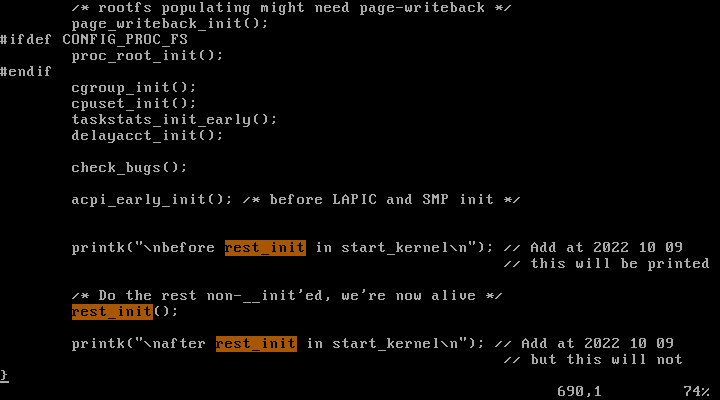
start_kernel에서는 rest_init을 호출한다.
init/main.c - rest_init :
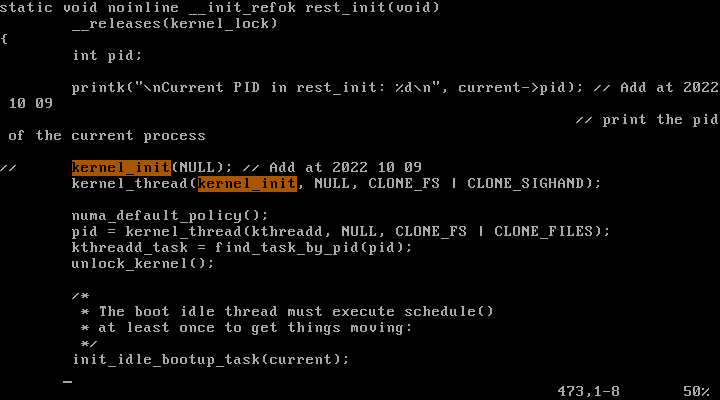
rest_init에서는 kernel_init을 호출한다.
init/main.c - kernel_init :
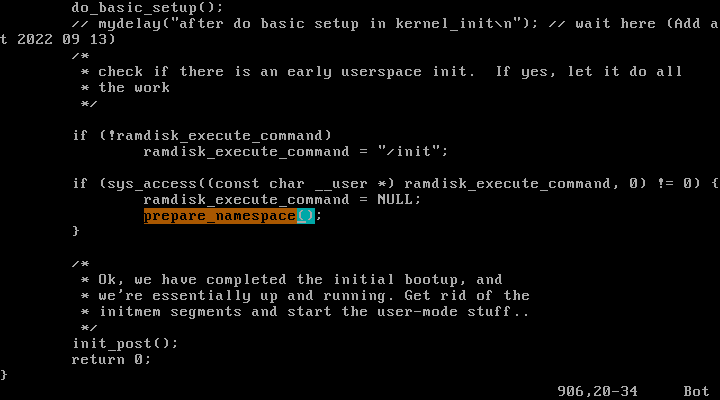
kernel_init에서는 init/do_mounts.c에 있는 prepare_namespace을 호출한다.
init/do_mounts.c - prepare_namespace :
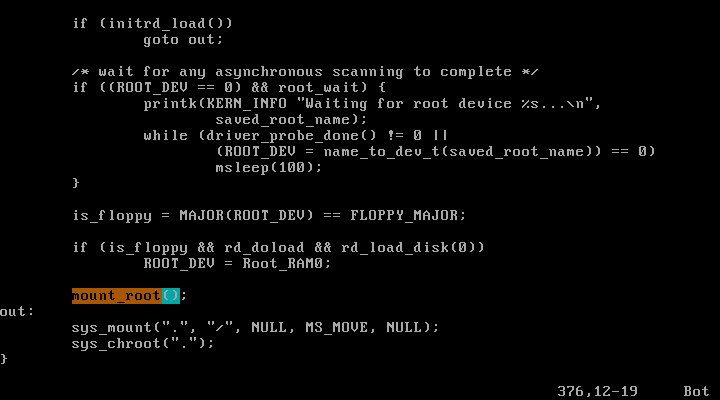
prepare_namespace에서는 mount_root을 호출한다.
init/do_mounts.c - mount_root :
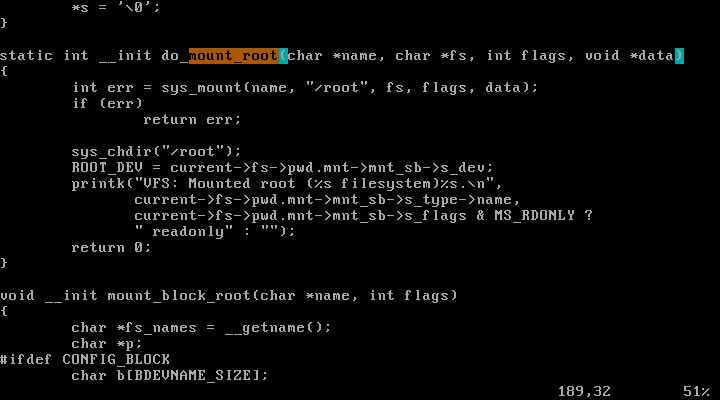
mount_root는 root file system을 caching한다.
4) Find the data type for each added variable for super_block, inode, buffer_head, and dentry.
include/linux/fs.h:
struct super_block {
struct list_head s_list; /* Keep this first */
dev_t s_dev; /* search index; _not_ kdev_t */
unsigned long s_blocksize;
unsigned char s_blocksize_bits;
unsigned char s_dirt;
unsigned long long s_maxbytes; /* Max file size */
struct file_system_type *s_type;
const struct super_operations *s_op;
struct dquot_operations *dq_op;
struct quotactl_ops *s_qcop;
const struct export_operations *s_export_op;
unsigned long s_flags;
unsigned long s_magic;
struct dentry *s_root;
struct rw_semaphore s_umount;
struct mutex s_lock;
...
};
struct inode {
struct hlist_node i_hash;
struct list_head i_list;
struct list_head i_sb_list;
struct list_head i_dentry;
unsigned long i_ino;
atomic_t i_count;
unsigned int i_nlink;
uid_t i_uid;
gid_t i_gid;
dev_t i_rdev;
u64 i_version;
loff_t i_size;
#ifdef __NEED_I_SIZE_ORDERED
seqcount_t i_size_seqcount;
#endif
struct timespec i_atime;
struct timespec i_mtime;
struct timespec i_ctime;
unsigned int i_blkbits;
blkcnt_t i_blocks;
unsigned short i_bytes;
umode_t i_mode;
spinlock_t i_lock; /* i_blocks, i_bytes, maybe i_size */
struct mutex i_mutex;
...
};
include/linux/buffer_head.h:
struct buffer_head {
unsigned long b_state; /* buffer state bitmap (see above) */
struct buffer_head *b_this_page; /* circular list of page's buffers */
struct page *b_page; /* the page this bh is mapped to */
sector_t b_blocknr; /* start block number */
size_t b_size; /* size of mapping */
char *b_data; /* pointer to data within the page */
struct block_device *b_bdev;
bh_end_io_t *b_end_io; /* I/O completion */
void *b_private; /* reserved for b_end_io */
struct list_head b_assoc_buffers; /* associated with another mapping */
struct address_space *b_assoc_map; /* mapping this buffer is associated with */
atomic_t b_count; /* users using this buffer_head */
};
include/linux/deache.h:
struct dentry {
atomic_t d_count;
unsigned int d_flags; /* protected by d_lock */
spinlock_t d_lock; /* per dentry lock */
struct inode *d_inode; /* Where the name belongs to - NULL is negative */
/*
* The next three fields are touched by __d_lookup. Place them here
* so they all fit in a cache line.
*/
struct hlist_node d_hash; /* lookup hash list */
struct dentry *d_parent; /* parent directory */
struct qstr d_name;
struct list_head d_lru; /* LRU list */
/*
* d_child and d_rcu can share memory
*/
union {
struct list_head d_child; /* child of parent list */
struct rcu_head d_rcu;
} d_u;
struct list_head d_subdirs; /* our children */
struct list_head d_alias; /* inode alias list */
unsigned long d_time; /* used by d_revalidate */
struct dentry_operations *d_op;
struct super_block *d_sb; /* The root of the dentry tree */
void *d_fsdata; /* fs-specific data */
#ifdef CONFIG_PROFILING
struct dcookie_struct *d_cookie; /* cookie, if any */
#endif
int d_mounted;
unsigned char d_iname[DNAME_INLINE_LEN_MIN]; /* small names */
};
5) Change the kernel such that it displays all superblocks before it calls mount_root and after mount_root. Boot with “My Linux3” to see what happens.
모든 superblocks를 표시하기 위해 아래 코드를 prepare_namespace 함수 정의 전에 추가해주었다.
void display_superblocks(){
struct super_block *sb;
list_for_each_entry(sb, &super_blocks, s_list) {
printk("dev name:%s dev maj num:%d dev minor num:%d root ino:%d\n",
sb->s_id, MAJOR(sb->s_dev), MINOR(sb->s_dev),
sb->s_root->d_inode->i_ino);
}
}

그리고, prepare_namespace 함수 정의 내에서 mount_root 함수를 호출하는 부분의 앞뒤로 display_superblocks() 함수를 호출해주었다.
변경사항을 적용하기 위해 컴파일하고, 재부팅하며 부팅 메세지를 확인하였다.
$ make bzImage
$ cp arch/x86/boot/bzImage /boot/bzImage
$ reboot
# Boot with "My Linux3"
$ dmesg > x
$ vi x


mount_root가 호출된 이후에는 “dev name: sda3, dev major num: 8, dev minor num: 3, root ino: 2”가 더 출력된다.
디바이스 번호는 각 디바이스의 고유번호이다. “/dev”에 각 디바이스의 파일 이름이 적혀 있고, ls -l을 통해 각 디바이스의 major, minor 번호를 볼 수 있다. major 번호는 그 디바이스의 번호이고, minor 번호는 그 디바이스 종류 안에서의 구별 번호를 의미한다. 위 내용은 “Documentation/devices.txt”으로 가면 자세한 정보를 볼 수 있다.
6) Change the kernel such that it displays all cached inodes before it calls mount_root and after mount_root. Boot with “My Linux3” to see what happens.
To display all cached indoes, use below.
extern struct list_head inode_in_use;
void display_all_inodes(){
struct inode *in;
list_for_each_entry(in, &inode_in_use, i_list){
printk("dev maj num:%d dev minor num:%d inode num:%d sb dev:%s\n",
MAJOR(in->i_rdev), MINOR(in->i_rdev), in->i_ino, in->i_sb->s_id);
}
}
6-1) Modify display_all_inodes such that it can also diplay the file name and file byte size of each file represented by the inode.
6-2) Make a system call that displays file name and file byte size of all inodes in use. Show only the first 100 files. Look at the result with dmesg command.
6-3) Modify your system call in 6-2) so that it can display mounting points. Mount myfd to temp directory and confirm your system call can detect it.
7) The pid=1 process (kernel_init) eventually execs to /sbin/init with run_init_process("/sbin/init"); by calling kernel_execve("/sbin/init", ....) in init/main.c/init_post(). Change the kernel such that it execs to /bin/sh. Boot the kernel, and you will find you cannot access /boot/grub/grub.conf. Explain why.
init/main.c :

커널이 로드되면 메모리, 프로세서, I/O 등 여러 하드웨어를 초기화하고 설정한다. 압축된 initramfs 이미지를 메모리의 미리 정해진 위치로부터 읽어 “/sysroot/”에 직접 풀고, 모든 필요한 드라이버를 로드한다. 그 후, 커널은 루트 장치를 생성하여 읽기 전용으로 루트 파티션을 마운트하고 사용되지 않는 메모리를 해제한다.
커널이 로드되면 사용자 환경을 설정하기 위해 “/sbin/init” 프로그램을 실행한다. “/sbin/init” 프로그램은 최상위 프로세스(pid = 1)로, 나머지 부트 프로세스를 주관하며 사용자를 위한 환경을 설정하는 역할을 한다.
“/sbin/init”는 파일 시스템의 구조를 검사하고, 시스템을 마운트하고, 서버 데몬을 띄우고, 사용자 로그인을 기다리는 등의 역할을 한다. 만약 “/sbin/init”을 실행하지 않고 “/bin/sh”를 실행하면, “/dev/sda1”가 “/boot”에 연결되지 않을 것이다.
8) Try following code. Make /aa/bb and type some text with length longer than 50 bytes. Explain the result.
$ cd / # cd /로 /에 가서
$ mkdir aa # mkdir aa로 /aa 디렉토리를 만들고
$ cd aa # cd aa로 aa에 이동해서
$ vi bb # vi bb로 /aa/bb를 만듭니다.

$ vi ex1.c
ex1.c :
#include <fcntl.h>
#include <stdio.h>
#include <unistd.h>
int main(void)
{
char buf[100];
int x = open("/aa/bb", O_RDONLY, 00777);
int y = read(x, buf, 10);
buf[y] = '\0';
printf("we read %s\n", buf);
lseek(x, 20, SEEK_SET);
y = read(x, buf, 10);
buf[y] = '\0';
printf("we read %s\n", buf);
int x1 = dup(x);
y = read(x1, buf, 10);
buf[y] = '\0';
printf("we read %s\n", buf);
link("/aa/bb", "/aa/newbb");
int x2 = open("/aa/newbb", O_RDONLY, 00777);
y = read(x2, buf, 10);
buf[y] = '\0';
printf("we read %s\n", buf);
return 0;
}

첫번째 printf 시점의 buf는 /aa/bb의 10바이트만큼 read한 것이므로 “0123456789”가 출력되었다.
두번째 printf 시점에 x의 포인터는 lseek를 통해 문자열의 현재 위치로부터 20바이트만큼 옮겨졌다. 이 때의 출력되는 buf는 파일의 20바이트부터 10바이트만큼 read한 것이므로 “9876543210”이 출력되었다.
세번째 printf 시점에는 x1이 dup를 통해 x로부터 복제되었다. 이 때의 출력되는 buf는 두번째 printf 시점에서 마지막으로 읽은 위치의 다음 위치부터 10바이트만큼 read한 것이므로 “klmnopqrst”가 출력되었다.
네번째 printf 시점에 link를 통해 /aa/newbb가 같은 파일인 /aa/bb를 가리키게 되었다. buf는 새로운 /aa/newbb의 10바이트만큼 read한 것이므로 “0123456789”가 출력되었다.
9) Check the inode number of /aa/bb and /aa/newbb and confirm they are same.
$ ls –i /aa/*

/aa/bb와 /aa/newbb의 inode number는 “502947”로 동일한 것을 확인하였다.
10) Try fork() and confirm the parent and child can access the same file.
ex2.c :
#include <fcntl.h>
#include <stdio.h>
#include <unistd.h>
int main(void)
{
char buf[100];
int x = open("/aa/bb", O_RDONLY, 00777);
int y = fork();
int z;
if (y == 0)
{
z = read(x, buf, 10);
buf[z] = '\0';
printf("child read %s\n", buf);
}
else
{
z = read(x, buf, 10);
buf[z] = '\0';
printf("parent read %s\n", buf);
}
return 0;
}

parent와 child가 동일한 파일에 접근한 것을 확인할 수 있다. 프로세스가 fork되면 x의 f_pos가 저장되는 위치도 같이 복사되므로 두 프로세스가 이를 공유하게 된다. 따라서 parent는 child가 읽었던 부분부터 계속 읽게 된다.
11) (Using chroot and chdir) Do following and explain the result of ex1.
a. Make f1 in several places with different content (in /, in /root, and in /root/d1) as follows.
$ cd /
$ echo hello1 > f1
$ cd
$ echo hello2 > f1
$ mkdir d1
$ echo hello3 > d1/f1
b. Make ex3.c that will display “/f1” before and after chroot, and “f1” before and after chdir as follows.
ex3.c :
#include <fcntl.h>
#include <stdio.h>
#include <unistd.h>
void display_root_f1(void) // display the content of "/f1"
{
char buf[100];
int x = open("/f1", O_RDONLY);
int y = read(x, buf, 100);
buf[y] = '\0';
printf("%s\n", buf);
}
void display_f1(void) // display the content of "f1"
{
char buf[100];
int x = open("f1", O_RDONLY);
int y = read(x, buf, 100);
buf[y] = '\0';
printf("%s\n", buf);
}
int main(void)
{
display_root_f1(); // display the content of "/f1"
chroot(".");
display_root_f1(); // display the content of "/f1"
display_f1(); // display the content of "f1"
chdir("d1");
display_f1(); // display the content of "f1"
return 0;
}

- 첫
display_root_f1은cd /로 이동해서 만든f1의 내용을 보여준다. chroot(".")를 통해 현재 디렉토리로 root가 변경이 되는데, 현재 디렉토리는 홈 디렉토리이다.- root가 변경된 이후로 다시
display_root_f1을 실행하면 현재 디렉토리가 root이므로 현재 디렉토리에 있는f1의 내용이 출력되므로 hello2가 출력이 된다. - 첫
display_f1은 현재 디렉토리의f1의 내용이 출력되므로 똑같이 hello2가 출력된다. chdir("d1")으로 현재 디렉토리를d1을 바꾼 뒤 실행하면,d1안쪽에 만든f1이 출력되므로 hello3이 출력된다.
12) Make a new system call, my_show_fpos(), which will display the current process ID and the file position for fd=3 and fd=4 of the current process. Use this system call to examine file position as follows. (Use %lld to print the file position since f_pos is long long integer)
arch/x86/kernel/syscall_table_32.S :

56번에 my_show_fpos 시스템 콜을 등록해준다.
fs/read_write.c :
asmlinkage void my_show_fpos(void)
{
printk("fd=3, f_pos=%lld\n", current->files->fdt->fd[3]->f_pos);
printk("fd=4, f_pos=%lld\n", current->files->fdt->fd[4]->f_pos);
}
ex4.c :
#include <fcntl.h>
#include <stdio.h>
#include <unistd.h>
void my_show_fpos()
{
syscall(56);
}
int main(void)
{
char buf[25];
int x = open("f1", O_RDONLY);
int y = open("f2", O_RDONLY);
my_show_fpos(); // f_pos right after opening two files
read(x, buf, 10);
read(y, buf, 20);
my_show_fpos(); // f_pos after reading some bytes
return 0;
}
$ make bzImage
$ cp arch/x86/boot/bzImage /boot/bzImage
$ reboot
# after reboot
$ echo 8 > /proc/sys/kernel/printk
$ ./ex4

x와 y는 각각 파일 디스크립터 3과 4를 의미한다. 각각 10글자, 20글자를 읽었으므로 f_pos가 0에서 10이, 10에서 20이 되었다.
13) Modify your my_show_fpos() such that it also displays the address of f_op->read and f_op->write function for fd 0, fd 1, fd 2, fd 3, and fd 4, respectively. Find the corresponding function names in System.map. Why the system uses different functions for fd 0, 1, 2 and fd 3 or 4?
fs/read_write.c :
asmlinkage void my_show_fpos(void)
{
printk("fd=3, f_pos=%lld\n", current->files->fdt->fd[3]->f_pos);
printk("fd=4, f_pos=%lld\n", current->files->fdt->fd[4]->f_pos);
// Update
int i;
for(i = 0; i < 5; i++) {
printk("fd=%d, read=%p\n", i, current->files->fdt->fd[i]->f_op->read);
printk("fd=%d, write=%p\n", i, current->files->fdt->fd[i]->f_op->write);
}
}
$ make bzImage
$ cp arch/x86/boot/bzImage /boot/bzImage
$ reboot
# after reboot
$ echo 8 > /proc/sys/kernel/printk
$ ./ex4

read와 write 함수의 주소를 출력할 수 있게 했다. 출력된 주소를 리눅스 코드의 System.map에서 찾아보면 아래와 같이 나온다. System.map은 컴파일할 때마다 리눅스 코드 디렉토리에 생성된다.
14) Use my_show_fpos() to explain the result of the following code. File f1 has “ab” and File f2 has “q”. When you run the program, File f2 will have “ba”. Explain why f2 have “ba” after the execution.
#include <fcntl.h>
#include <stdio.h>
#include <unistd.h>
void my_show_fpos()
{
syscall(56);
}
int main(void)
{
char buf[10];
int f1 = open("./f1", O_RDONLY, 00777);
int f2 = open("./f2", O_WRONLY, 00777);
printf("f1 and f2 are %d %d\n", f1, f2); // make sure they are 3 and 4
if (fork() == 0)
{
my_show_fpos();
read(f1, buf, 1);
sleep(2);
my_show_fpos();
write(f2, buf, 1);
}
else
{
sleep(1);
my_show_fpos();
read(f1, buf, 1);
write(f2, buf, 1);
}
return 0;
}



fork에 의해 f_pos를 공유하는 프로세스 2개로 나누어진다.
가장 먼저 자식 프로세스에서 f1과 f2 초기 상태를 출력하고 둘 다 f_pos는 0이다.
그후 “f1” 파일을 읽어 buf에 저장한다. 현재 buf에서는 ['a']가 저장되어 있다.
자식 프로세스가 2초간 대기하는 사이에, 부모 프로세스는 f1과 f2 상태를 출력하고 이때 f1의 f_pos가 읽은 글자 수만큼 증가한 것을 확인할 수 있다.
다시 한 글자 읽어 buf에 저장하면 buf에는 ['b']가 저장되게 된다.
두 프로세스 사이에 buf와 같은 지역변수는 공유되지 않는다.
부모 프로세스의 buf를 “f2”에 저장하고, 1초 후 자식 프로세스의 buf를 “f2”에 저장하면 “f2”는 “ba”가 된다.
15) Find corresponding kernel code for each step below in open and read system calls:
x=open(fpath, .......);-
- find empty fd
-
- search the inode for “fpath”
- 2-1) if “fpath” starts with “/”, start from “fs->root” of the current process
- 2-2) otherwise, start from “fs->pwd”
- 2-3) visit each directory in “fpath” to find the inode of the “fpath”
- 2-4) while following mounted file path if it is a mounting point.
- search the inode for “fpath”
-
- find empty file{} entry and fill-in relevant information.
-
- chaining
-
- return fd
-
read(x, buf, n);-
- go to the inode for x
-
- read n bytes starting from the current file position
-
- save the data in buf
-
- increase the file position by n
-
16) Make a file, /f1. Write some text in it.
$ cd /
$ vi f1
..........
$
Try to read this file before “mount_root”, after “mount_root”, after sys_mount(“.”, “/”, …), and after sys_chroot(“.”) in init/do_mounts.c/prepare_namespace(). Explain what happens and why. For this problem, the kernel_init process should exec to /sbin/init.